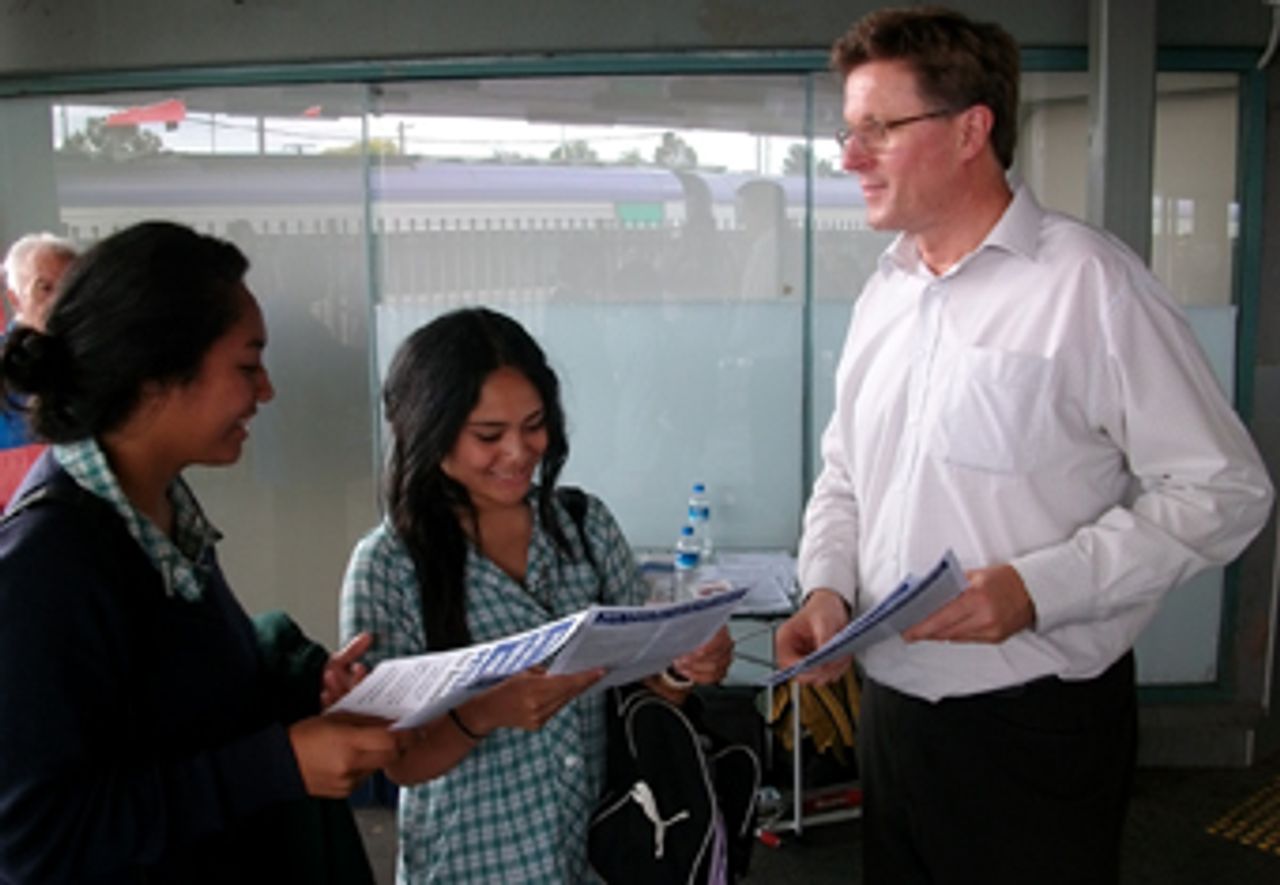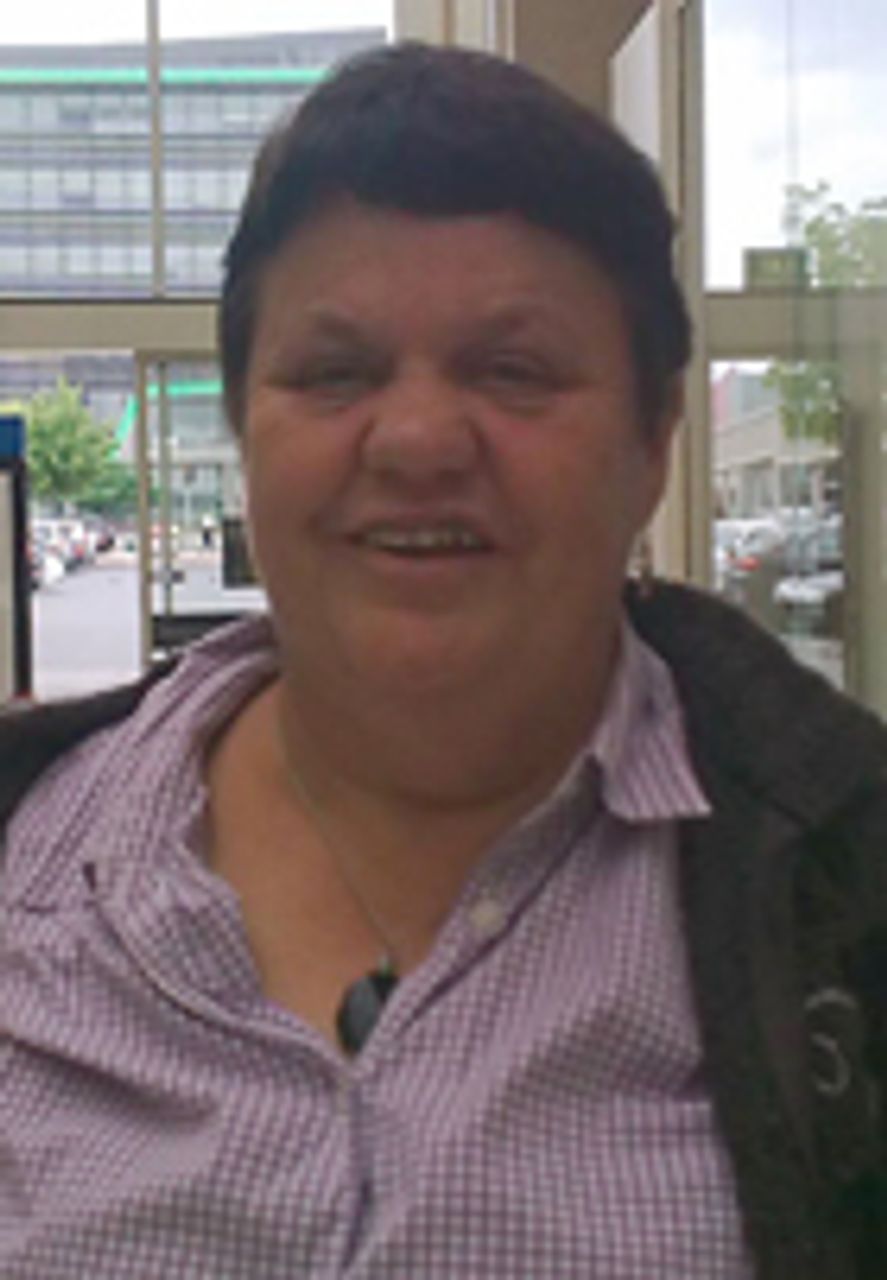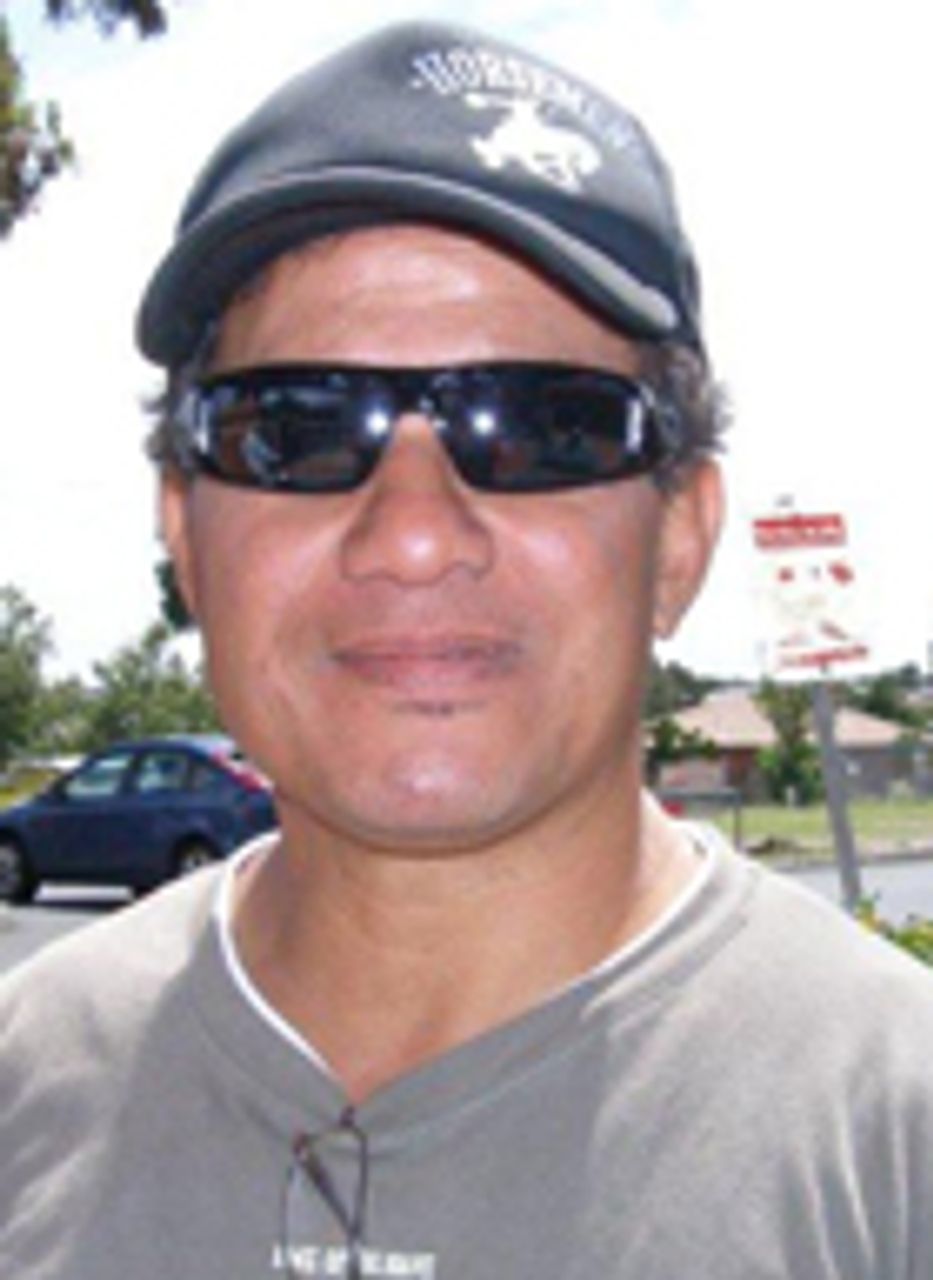The Socialist Equality Party has won important support from workers, the unemployed, and young people in the Broadmeadows by-election campaign being held in Victoria.
 Peter Byrne campaigning in Broadmeadows
Peter Byrne campaigning in BroadmeadowsThe SEP, and its candidate Peter Byrne, are the only ones actively campaigning in the electorate, advancing a socialist alternative to war, attacks on democratic rights and the accelerating assault on living standards. More than 10,000 of the SEP’s election statement “The socialist alternative in the Broadmeadows by-election” have been delivered to residents’ homes, and the party’s two public meetings have provided the only forums for working people to engage in political discussion.
The media has barely covered the by-election, reflecting the official consensus that the Labor Party and its wealthy property developer candidate Frank McGuire will win, and so there is nothing else to report. The Liberal Party, which came to office after defeating Labor in last November’s state election, has not even bothered to stand a candidate.
The other candidates—Greens, Sex Party, Democratic Labor Party, and independents—have nothing to say about any of the issues confronting the working class electorate, including the devastating social crisis.
Broadmeadows is one of the most culturally diverse areas in Victoria, with a large Arabic and Turkish population. Just 38 percent of residents speak only English at home. Long one of Melbourne’s manufacturing centres, Broadmeadows has suffered a wave of factory closures in recent decades, and the global economic crisis has further worsened the conditions of industrial workers in the area. The official unemployment rate is 15.9 percent, though this underestimates the true extent of joblessness. Youth unemployment has increased significantly over the past several years to the point where 53.4 percent of young people are now without a job.
* * *
A Visy worker at the company’s cardboard packaging plant in the northern suburb of Reservoir discussed the recent struggle of Visy workers in Melbourne and Sydney (see “Striking Visy workers arrested on picket line”). He explained how the trade unions divided the Visy workforce: “We at Reservoir asked to join forces [with the workers at the Dandenong plant] and go hard on the company, so we could win our wages and conditions back. Just three days before this [happened], Dandenong went on strike. The union got up and said to us, ‘We suggest you take this deal.’ They said, ‘Dandenong won’t join in if you go out.’ That is how they split us... When Dandenong went on strike, their work was sent to us and to Wodonga, and also Visy used helicopters to get people in. In the end Dandenong had to go back to work.”
He discussed the deteriorating conditions at Visy. “They have taken everything away from us,” the worker explained. “Many years ago when I started working there, when the weather reached a certain temperature, they would hand us out cans of soft drink. You used to be allowed to walk around—to have a break if you needed it. That has all gone. And now workers are set against each other.”
 Michael
MichaelMichael Morris previously worked for GoodPac Plastics in the suburb of Westmeadows but has been unemployed since the plant closed last year. He spoke about his experiences without a job. “Before I worked at GoodPac I did a course and got my fork lift driver’s licence at TAFE,” he said. “The money there was OK—$22 an hour, you could live on that wage—but you can’t live on the dole. I have no social life at all. On the dole you can’t save up to go to a concert for example—it’s too expensive... With the election, they should give someone else than Labor a go. Frank Maguire only comes here to get all the goodies he doesn’t deserve.”
 Pauline
PaulinePauline Puschka expressed the same frustration with being dependent upon the government’s poverty level unemployment benefit. “I’ve spent 19 years making seat belts and buckles for cars at Autoliv—but I lost my job at Christmas time. I’ve now got to go to wherever Centrelink sends me. Yesterday when I was trying to get a job, the company cancelled my appointment. I don’t want to live on the dole, I want to work. It hurts. I’m not useless—I’ve got good experience. I don’t like being mucked around.”
Carly added: “It’s very hard, because I haven’t had a job for nearly twelve months. It’s hard for people to give you a chance if you haven’t been employed for so long. We get left behind. Once, over a one-week period I applied for 40 to 50 jobs and only heard back from 2 or 3 of them. I have a medical exemption at the moment so I’m not forced to apply for jobs to qualify for unemployment benefit, but I’m always watching out for jobs and there aren’t many at the moment. I just looked a little while ago for hospitality jobs, and all that is available is kitchen hand work. I’m also limited with where I can work because of the cost of petrol. It is very tight living on unemployment benefits. I’m grateful for it, but the money doesn’t go far enough, there is hardly any moving space.
“I’m looking at starting a course at Broadmeadows TAFE midyear so that I can be a youth worker helping kids. I love helping people. But it depends on whether I can afford it, it’s so expensive—I’m interested in doing Certificate 4, but just to do Certificate 3 will cost $500 to $600, and that’s with my concession. It’s hard to save up that much while you’re on unemployment benefits, and I wouldn’t apply unless I knew I had the money to pay for it.”
Ozma, a single mother said: “I’d love to work—I have a diploma in children’s services, but if I work then I need to put my son in a child-care centre full time, and the wages I would get are so low that it is not worth it. It’s more difficult these days than it was two or three years ago, no one can find work. I struggle on welfare from fortnight to fortnight, at the end of the week I’m paying my bills and rent but there is nothing left.”
Asked about Prime Minister Julia Gillard’s ten-year commitment to the occupation of Afghanistan, she replied: “I don’t like the war in Afghanistan, I’m against all wars. Politicians should be fixing the country, not making a war.”
Bronwyn, a student, similarly told the SEP: “I don’t agree with the wars in Iraq or Afghanistan. At first I believed what was being said about them, but as far as I know, it is really about the oil. I know Gillard has said we will be there for ten years, but we shouldn’t have gone there in the first place. I reckon she has her interests with the rich... It doesn’t matter who gets in [government] because nothing ever changes.”
She spoke of her own experiences: “I’ve gone back to full time studying. I tried getting part-time work in reception and retail, I tried more than 30 jobs, but I couldn’t find anything. There have to be improvements made. I can’t go overseas now, instead I have to fall back on my parents. I think I will have to stay at home until I’m into my twenties.” Asked about developments in the Middle East, she answered: “I reckon the people in Egypt have done the right thing. From what I know, they didn’t look like they were doing too well, that’s why that’s happened.”
Many workers and young people who spoke with SEP campaigners were unaware of who Labor’s candidate was for the by-election—some did not even know there was a by-election—reflecting the general disinterest and hostility towards the Labor Party and the political establishment. Those who did know of Frank McGuire expressed disgust and frustration.
 Metin
MetinMetin, an ex-restaurant owner who is now unemployed, said: “McGuire says he grew up here and thinks that it means people will support him. But people are not that stupid. How many times does he actually come to Broadmeadows? Or visit the schools here? Anyone can grow up here. He is a multi-millionaire, so the question isn’t where he was born, but what he has done—or what he will do—for this area.”
 Joe
JoeJoe, a construction worker originally from Tonga, responded to McGuire’s assertion that unemployment in the area was high “because of the cost of labour”. “What does he mean that the cost of labour is too high?” Joe said. “In Broadmeadows! You can’t survive on anything less than the wages we get now. It’s fine for him to say that—he’s a multimillionaire... It’s true that factories are going overseas. That big biscuit factory moved overseas last year. Many workers lost their jobs. The owners are so greedy—they were already making money, but in China they can make more money!”
Joe expressed solidarity with the workers protesting in Egypt: “In Egypt a lot of people suffered. I don’t know much about it but if you see something like that it is because there is something wrong with the government there.”
After a discussion of the SEP’s program, he replied, “This is the first time I have heard of you. I want to come to hear what you have to say.”
Several residents in the Broadmeadows electorate complained of the environmental impact of corporate polluters.
Julie Thornton and her mother Marion live in Dallas, an area of Broadmeadows badly affected by industrial pollution. “We’ve got smells coming from Envirotank in Maffra Street—they do septic tanks. We get solvent smells, it’s putrid.”
Marion, after emigrating from Scotland in 1954, previously lived in Wollongong, New South Wales. SEP campaigners discussed with her the SEP-initiated workers’ inquiry into cancer clusters caused by BHP’s operations in Wollongong; Marion looked at some of the maps published in the pamphlet Cancer and Industrial Pollution, noting that she and her husband had lived in the affected area. “My husband worked at Figtree for BHP and I got a job at Stamina Trousers,” she explained. “My husband couldn’t breathe because of the pollution from BHP.”
She continued: “Julia Gillard is giving money to the big boys. They’re the controllers. My father was a miner in Scotland—he went on strike in the big one, you’d know about it, in 1926. Winston Churchill said: ‘If they won’t work, then shoot them.’ My dad hated him. He was like Thatcher and now Gillard.”
Residents affected by the Tullamarine toxic dump (see “Victorian government releases another whitewash of Tullamarine toxic dump hazard”) also spoke with the SEP.
Rosemary Carruthers, a cancer victim, lives in Westmeadows, in close proximity to the dump. “This is the third time now I’ve had to have treatment for cancer,” she said. “I thought it was all clear, but it has come back. When I was going through my second lot of treatment, my sister in-law got cancer. I know a lot of people who have had cancers among my neighbours. I don’t like the idea of what is happening in our area. My youngest son lived near the dump—it’s worrying, especially with little kids.”
Another local resident, John Cuneen, denounced the government-EPA (Environment Protection Authority) whitewash of residents’ concerns of cancer clusters. Last Monday the EPA held the first of a series of “open house” events to present its latest report finding there is no health hazard.
“This is risk communication in its finest form,” John explained after attending the event. “It’s how you calm people down and tell them that what’s going on is no more a risk than anything normal like crossing the road. But there is a risk—no matter what the EPA says. The horrendous nature of the chemicals in that quarry cannot just be ignored. This is an old quarry which was never designed for this. The science the EPA quotes is speculative. Their actual testing procedure is totally unscientific. Scientists don’t always act as scientists. Things are left aside. I’m going to read this current report in detail when I get home. Who is paying the bill for the findings?
John continued: “Industry spokesmen have said they can’t be treated harshly. The president of the manufacturing industry says that any intensification of prosecutions will result in industry going underground with its practice. Thank goodness the whole community doesn’t act like this... The EPA has been non-existent as far as the toxic dump is concerned. I remember back in the early 1980s, when there was a terrible stench from the dump, the officer responsible told me that she couldn’t smell a thing. In all that time nothing has changed.”
Authorised by Nick Beams, 113/55 Flemington Rd, North Melbourne 3051.
